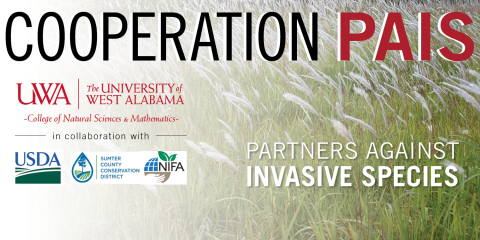
Cooperation PAIS to support landowners in controlling feral pigs, cogongrass, and other invasive species
The University of West Alabama will host its first West Alabama Symposium on the Management of Invasive Species October 3-5.
The second program sponsored by Cooperation PAIS (Partners Against Invasive Species), the symposium is open to the public, and land owners and property managers are strongly encouraged to attend. There is a $25 registration fee per attendee.
Cooperation PAIS is a joint effort between UWA, certified Non-Land Grant College of Agriculture, and the Sumter County Soil and Water Conservation District, a unit of the Alabama Soil and Water Conservation Committee. The collaboration will support area land owners in controlling invasive species of plants and animals, and is funded through the United States Department of Agriculture’s National Institute of Food & Agriculture (USDA, NIFA).
“This project is targeted at providing education on invasive species and outreach activities to farmers, ranchers and foresters in the west Alabama region,” explained Dr. John McCall, dean of UWA’s College of Natural Sciences and Mathematics.
The symposium will kick-off on Wednesday, October 3 at the ALFA Environmental Center at 5 p.m. with an informal reception. Two concurrent breakout sessions will last throughout the day on Thursday, Oct. 4, in Bibb Graves Hall, followed by a keynote address from Dr. Tony Frazier, the State Veterinarian at the Alabama Department of Agriculture, and a dinner social. Attendees will be taken on demonstrative field trips on Friday, October 5.
Dr. Lee Stanton, associate professor of biological and environmental sciences will lead one breakout session highlighting the invasive flora, or plants, of the area. McCall will lead the session focusing on the invasive fauna, or animals.
Feral pigs and cogongrass were chosen as the two invasive species to be targeted for year one of the program, but other invasive plants and insects will also will be discussed at the symposium.
Feral pigs have had tremendous economic impact on crops and rangeland and also do significant ecological damage by carrying a growing number diseases that affect both livestock and humans.
Cogongrass is an invasive grass known to severely impact crops, rangelands, and pine forests. The grass burns ultra-hot and poses a significant threat in the spread of brush fires.
Management of invasive species like feral pigs and cogongrass will be a joint effort between researchers at both UWA and the Sumter County Conservation District. They will provide assistance to regional land owners through outreach, shared resources, such as the use of traps, and trained student interns who will collaborate with land owners.
The ultimate goal for the project is to develop a regional center of expertise dedicated to research and management of invasive flora and fauna, particularly with regard to its impact on farms, ranches and forests of west Alabama and east Mississippi.
“We also expect that Cooperation PAIS will help grow student enrollment in agricultural sciences at UWA,” added McCall, as it will provide more hands-on opportunities for students to learn in their field.For more information on the West Alabama Symposium on the Management of Invasive Species or Cooperation PAIS, contact UWA’s Dr. John McCall at (205) 652-3414 or jmccall@uwa.edu.